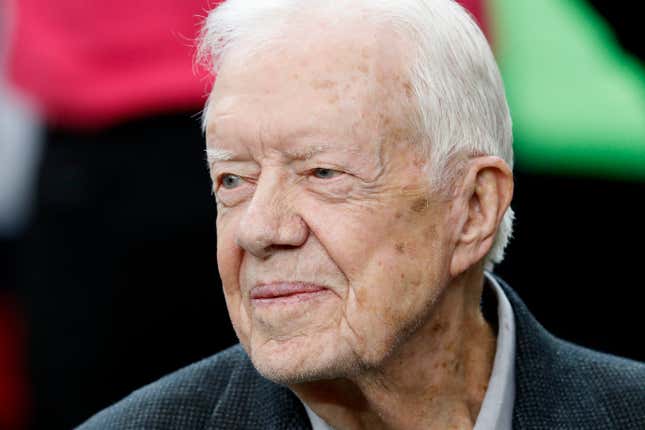Jimmy Carter's Strange and Complicated Legacy With Black America
Jimmy Carter, the 39th president of the United States, died Sunday in Plains, Georgia. He was 100.
By
Jessica Washington
PublishedSunday 4:31PM

Former President Jimmy Carter sits on the Atlanta Falcons bench before the first half of an NFL football game between the Atlanta Falcons and the San Diego Chargers, Oct. 23, 2016,Photo: AP Photo (AP)
At the ripe age of 100, Jimmy Carter, a former peanut farmer, was the 39th president of the United States and the longest living American president. He died Sunday at his home in Plains, Georgia, according to his son James E. Carter III per The Washington Post. Beloved and misunderstood, Carter especially had a complicated relationship with Black America. It might surprise you to learn that the man who would eventually win the overwhelming support of Black voters for President (twice), wasn’t always seen as a friend to the Black community.
Suggested Reading
The Root Remembers One of Our Own: Stephanie Holland
Students Allegedly Asked This Black Utah Grad Student For An "N-Word Pass," But Wait...There's More
North Carolina DoorDash Driver Dead After Altercation With McDonald's Employee During an Order Pickup
Cheat Sheet: What Is Hospice Care?
0:16 / 1:55
CC
Share
Cheat Sheet: What Is Hospice Care?
To call Carter’s early relationship with the Black community complicated, would be the understatement of the century. As a candidate for Georgia governor, Carter cozied up with avowed segregationists, earning himself a rather unflattering description from the premier state newspaper, the Atlanta Journal Constitution. In their opposition to his candidacy they called him “ignorant, racist, backward, ultra-conservative, red-necked South Georgia peanut farmer.”
Related Content
Black Twitter Reacts to Jimmy Carter's Death, These Photos Show How Black Folks Got Down With Carter, Jimmy Carter Was the First Politician to Listen to Black Folks, and Other News About Jimmy Carter
Jimmy Carter Was the First Politician to Listen, Openly, To Black Folks
But in his personal life, the rural Georgian politician had taken stances in favor of integration. At his Baptist church, Carter and his wife, the late Rosalynn Carter, were two of only three congregants to vote in favor of integration. (He later joined an integrated church, the Maranatha Baptist Church) And as renewed segregationist sentiment swept through the South after Brown v. Board, Carter was one of the only white men in his community to refuse to join the local chapter of the white supremacist group, The White Citizens’ Council.
The clear contradictions didn’t go unnoticed by Black Americans, who overwhelmingly supported Carter’s primary opponent in the Georgia Governor’s race. But as evidenced by Black voters later support of Carter, his story doesn’t end there.
It’s hard to know exactly what changed with Carter. It’s possible that the fact he was no longer running in the Deep South meant he felt safe standing by the convictions he’d espoused in his personal life. But in his inaugural address as Governor in 1970, Carter hit a different note than his campaign, swearing “the time for racial discrimination is over.”
00:04
03:36
Read More
From there, Carter began to build a relationship with Black civil rights leaders that would continue into his Presidency.
“Civil rights leaders felt comfortable negotiating with him,” says Andra Gillespie, an American Politics Professor at Emory University, where Carter also served as a Professor.
That didn’t mean Carter and civil rights leaders always say eye to eye. During one of Gillespie’s classes that Carter guest-lectured, she says he described a moment of tension between himself and civil rights leaders during negotiations of the Humphrey-Hawkins Act, which sought to grant full employment to Americans.
“The bill was so watered down by amendments that it didn’t do anything,” explains Gillespie, “and it was really interesting to hear President Carter explain his take on what happened with that bill to my class. So basically, he was like, civil rights leaders were demanding things that were just not possible.”
Despite these tensions, Carter accomplished a lot for the Black community while in office, says Gillespie. “For his time, he had the most diverse cabinet that anybody prior to that had had,” she says.
And as a former-President, Gillespie said that he continued to push for racial equality. “When President Obama was in office and Republicans were openly talking about obstructing him with a goal of trying to do ruin his chances for re-election, he was the one one who on television and said that’s racist,” says Gillespie.
Gillespie says that Obama likely would have struggled to make the argument himself as a Black man and current President, but that Carter “didn’t sugar coat it.”
“He just straight up said these attacks are racist to try to use his political capital to be able to shake people into realizing that the attacks against Obama were more than just partisan posturing,” says Gillespie. “I think that’s an example of ally-ship.”
Outside of his work in politics, Gillespie says that Carter’s humanitarian work with groups like Habitat for Humanity have directly benefited Black people in the United States and globally.
More from The Root
This Diddy Claim By a White Party Attendee is Creepier Than Most Others
WATCH: Katt Williams Confesses That This Is the One Person He Regrets Joking About
A Whole Group of New Jersey Cops Sent Racist, N-Word-Filled Text Messages. Their Consequences are Infuriating.
Folks Are Calling the Alleged New Orleans Killer a 'Terrorist,' But His Background Will Surprise You
“Jimmy Carter will be known for having the most successful post-Presidency of anybody,” says Gillespie. “I think he’s the standard and the model for what a post-Presidency looks like, using the platform that was gained by having held the most powerful office in the world to go do good for others.”
No comments:
Post a Comment